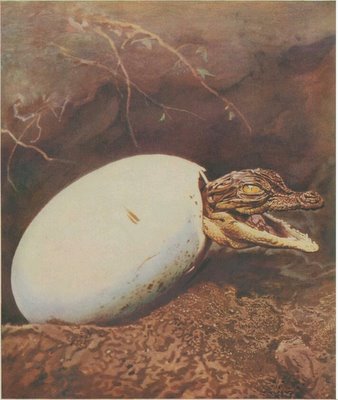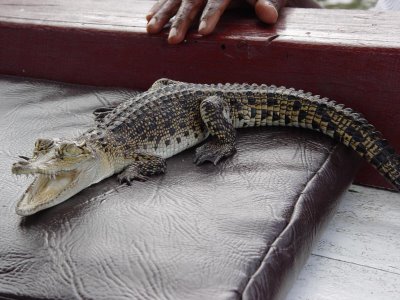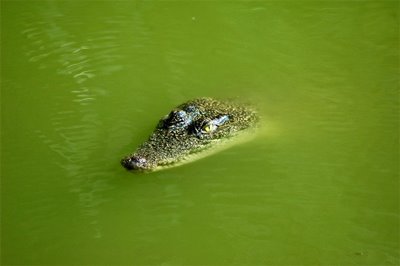 The crocodiles (colloquially called crocs), are large aquatic reptiles that live throughout the Tropics in Africa, Asia, the Americas and Australia. Crocodiles tend to congregate in slow-moving rivers and lakes, and feed on a wide variety of living and dead mammals and fish. Some species, notably the Saltwater Crocodile of Australia and the Pacific islands, have been known to venture far out to sea. They are an ancient lineage, and are believed to have changed little since the time of the dinosaurs.
The crocodiles (colloquially called crocs), are large aquatic reptiles that live throughout the Tropics in Africa, Asia, the Americas and Australia. Crocodiles tend to congregate in slow-moving rivers and lakes, and feed on a wide variety of living and dead mammals and fish. Some species, notably the Saltwater Crocodile of Australia and the Pacific islands, have been known to venture far out to sea. They are an ancient lineage, and are believed to have changed little since the time of the dinosaurs. The larger species of crocodiles can be very dangerous to humans. The Saltwater and Nile Crocodiles are the most dangerous, killing hundreds of people each year in parts of South-East Asia and Africa. American Alligators, Mugger crocodiles and possibly the endangered Black Caiman, are also very dangerous to humans. Crocodiles are the leading cause of animal related deaths as of 2001.
The larger species of crocodiles can be very dangerous to humans. The Saltwater and Nile Crocodiles are the most dangerous, killing hundreds of people each year in parts of South-East Asia and Africa. American Alligators, Mugger crocodiles and possibly the endangered Black Caiman, are also very dangerous to humans. Crocodiles are the leading cause of animal related deaths as of 2001. Crocodiles are very fast over short distances, even out of water. They have extremely powerful jaws and sharp teeth for tearing flesh, but cannot open their mouth if it is held closed, hence there are stories of people escaping from the long-snouted Nile Crocodile by holding its jaws shut. Indeed, zoologists will often subdue crocodiles for study or transport by taping their jaws or holding their jaws shut with large rubber bands cut from automobile inner tubes. All large crocodiles also have sharp welters and powerful claws. They have limited lateral movement in their neck, so on land one can find protection by getting even a small tree between the crocodile's jaws and oneself.
Crocodiles are very fast over short distances, even out of water. They have extremely powerful jaws and sharp teeth for tearing flesh, but cannot open their mouth if it is held closed, hence there are stories of people escaping from the long-snouted Nile Crocodile by holding its jaws shut. Indeed, zoologists will often subdue crocodiles for study or transport by taping their jaws or holding their jaws shut with large rubber bands cut from automobile inner tubes. All large crocodiles also have sharp welters and powerful claws. They have limited lateral movement in their neck, so on land one can find protection by getting even a small tree between the crocodile's jaws and oneself.

Crocodiles are ambush hunters, waiting for fish or land animals to come close, then rushing out to attack. As cold-blooded predators, they can survive long periods without food, and rarely need to actively go hunting. The crocodile's bite strength is up to 3,000 pounds per square inch, comparing to just 100 psi for a labrador retriever or 350 psi for a large shark. Despite their slow appearance, crocodiles are the top predators in their environment, and various species have been observed attacking and killing big cats such as lions,large ungulates and even sharks. A famous exception is the Egyptian Plover which is said to enjoy a symbiotic relationship with the crocodile. According to unauthenticated reports, the plover feeds on parasites that infest the crocodile's mouth and the reptile will open its jaws and allow the bird to enter to clean out the mouth.




